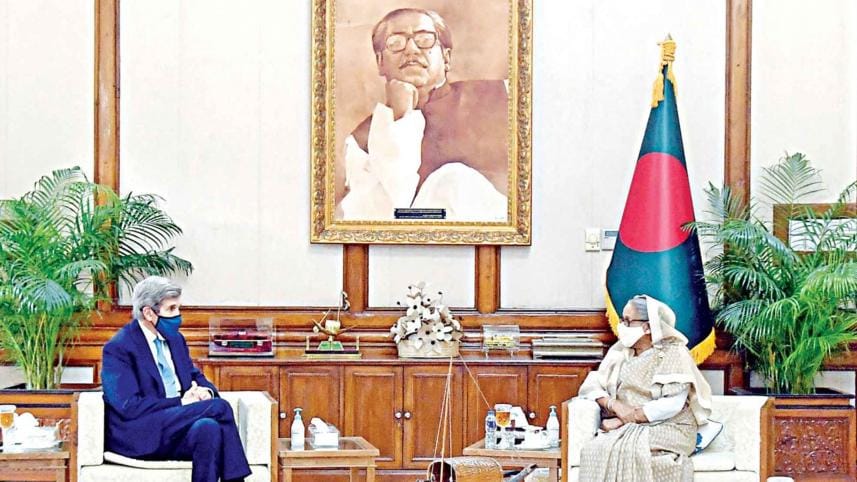Climate Diplomacy and John Kerry’s Bangladesh visit

During his recent visit to Bangladesh, John Kerry, the US special presidential envoy for climate, handed over an invitation letter to Prime Minister Sheikh Hasina to participate in the forthcoming virtual Leaders' Summit on Climate. The summit, to be held on April 22-23 and attended by 40 world leaders, will be hosted by the US President Joe Biden. The in-person visit by John Kerry, official statements and comments made by the US president, government officials and the US embassy here in Dhaka indicate that Joe Biden's government is dealing with the climate change issues with utmost importance.
This scenario is completely different to the era of former President Donald Trump who withdrew the US from the Paris Agreement at the end of 2019. The Doomsday Clock, the symbol of human-made catastrophe, was moved closer to midnight at the beginning of the Trump administration, whereas the Doomsday Clock Panel welcomed President Joe Biden for re-joining the Paris Agreement. Biden's commitment to provide additional financial support for climate actions has also attracted pledges from other countries. The climate change issue has also been placed at the centre of foreign policy, diplomacy and national security of the present government. It is expected that the Leaders' Summit will adopt strong and useful commitments for ensuring sustainable economic benefits for all countries.
The summit is more significant for Bangladesh as the country has achieved worldwide recognition as a resilient nation. It has been learned that in this summit, Prime Minister Sheikh Hasina will be especially recognised for her leadership in managing climate change-related challenges. In 2015, she was also awarded with the "Champions of Earth" for her leadership. As chair of the Climate Vulnerable Forum and the Vulnerable Twenty Group of Ministers of Finance, Bangladesh is also expected to play an important role in the 26th session of the Conference of the Parties (COP26) to the UNFCCC. Such confidence in Bangladesh's role is an acknowledgement of all that the country has done and achieved in this respect—Indigenous coping and adaptation techniques (developed over time by the climate change and disaster affected people of Bangladesh), combined with national drivers, e.g. plans and policies, regulatory and legal frameworks, establishment of Climate Change Trust Fund, attempts to make the economy sustainable and several other steps.
Although climate-vulnerable non-industrialised countries are not responsible for carbon emissions or global warming, they have to pay the price for the negative consequences of climate change. The Leaders' Summit, called by the country most responsible for greenhouse gas emissions, is creating a hope for the climate-vulnerable countries. Giving Bangladesh a prominent place in the summit is also related to the speech delivered by Sheikh Hasina in COP25, where she stressed that there is no alternative to implementing the Paris Agreement. Countries agreed to take initiatives to limit global warming to well below 2 degrees Celsius in COP26, which was supposed to be held in 2020. However, it is expected that in the US Leaders' Summit in April and COP26 in November 2021 in Glasgow, UK, remarkable climate change mitigation steps will be undertaken.
It must be mentioned that in the post-COP25 period, some of the industrialised countries attempted to lower the emission of carbon dioxide, which can be linked with Covid-19 pandemic. It has been estimated that in the first quarter of 2020, carbon emissions dropped by an estimated 17 percent and the total emissions were four-to-seven percent lower compared to 2019. However, such reductions in carbon emission are certainly not going to be sustained when it comes to the question of economic growth. It is, therefore, expected that vulnerable countries like Bangladesh will raise their voices not only for seeking compensation for adaptation but also for decreasing carbon emissions as per the Paris Agreement. For that, useful solutions such as use of alternative energy and other initiatives for sustainable economy have to be identified.
Government and private-sector investments for achieving climate mitigation and adaptation objectives may also help in reducing greenhouse gas emissions. As the US government has already expressed its commitment to implementing the Paris Agreement, it is expected that sustainable economic development, investment, and innovation will be at the centre of the climate policies of other industrialised countries. However, any step to mitigate the negative consequences of climate change will benefit the vulnerable countries. Despite being climate-vulnerable, Bangladesh has already been scheduled to officially become a developing country in 2026. The country has its own vision for protecting the environment, biodiversity, wild life, agriculture, forest, water and other resources. To continue with its economic growth, Bangladesh has to fight with climate change-induced disasters such as floods, cyclones, river erosions, salinity intrusion, etc. and of course, the Covid-19 pandemic.
In this post-pandemic era, resilience, adaptation and climate change mitigation should be aligned with increasing investments in health, food, shelter, and social safety net coverage from an intersectionality perspective. Not knowing the exact causes or being able to find remedies to come out of the pandemic, world leaders must focus on the public health support system of climate-vulnerable countries. It is expected that Bangladesh will play an effective role in the Leaders' Summit and will be successful in finding sustainable solutions for the people living with climate change-induced disasters.
Dr Mahbuba Nasreen is Director and Professor at the Institute of Disaster Management and Vulnerability Studies, Dhaka University. Email: mnasreen@du.ac.bd




 For all latest news, follow The Daily Star's Google News channel.
For all latest news, follow The Daily Star's Google News channel.
Comments